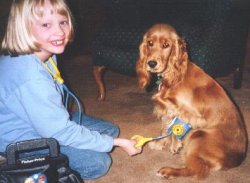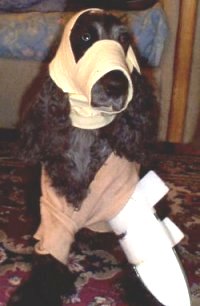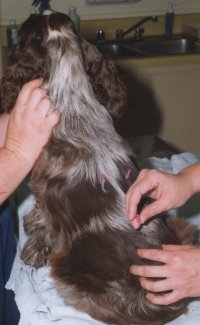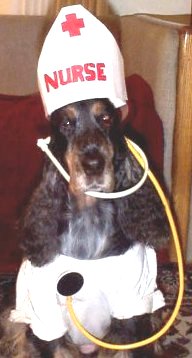
Beth & Emma - Owczarzak |
You
can help add years to your dog's life if you follow a few simple
steps.
1) Preventative medicine is the
first priority. Keep vaccinations up to date.
Routine exams for intestinal parasites should be performed, and preventative heartworm medication
should be given routinely.
|
| 2)
Try to make sure that any visiting animals, or animals he comes in
contact with on a regular basis during walks and exercise periods are
current on their vaccinations as well. Although your pet will become
less susceptible to some viruses as he ages, rabies, distemper as well
as parvo and corona viruses are not limited to pups. He could still
catch potentially life-threatening diseases from unvaccinated animals.
|
|
3) Watch what your pet eats. You
can decrease the incidence of heart problems by keeping the weight
down (ask your breeder what your particular dog should weigh when
fully grown) and making certain that the salt intake is at a minimum.
4) Maintain good dental practices
with your pet. Severe gum or tooth disease can easily cause secondary
heart and kidney infections as bacteria breaks away from the mouth and
gets into the bloodstream. Give your pets special treats to chew that
are made to break down and prevent tartar buildup. Ask your vet to
show you how to brush your pet's teeth and follow their
recommendations.
|

"The English Cocker Patient"
- Savoy
|
|

Doggie Acupuncture - Land
|
5) Daily exercise is truly the
best medicine. You and your pet can both benefit if his exercise is
combined with your own, as you walk or jog or just enjoy a good game
of tennis (sans net and racket. . .everyone knows tennis
balls were surely created for English cockers!). Just as with humans, always
check with your vet before starting any vigorous exercise program.
6) Never allow your pet to roam
freely. Not only will he be endangered by cars and stray dogs, but
could also be the target of a thief. Once a dog is very well trained,
he may be allowed off-lead while supervised, but allowing him to roam without supervision is
|
|
asking for
trouble for him (and in today's world, asking for potential lawsuits for
yourself as well!).
|
|
7) As your pet gets older, his
joints may succumb to arthritis which cold weather will make worse. Be
sure your dog has a draft-free place to sleep. If he sleeps on
the floor or in a crate, make certain he has a soft, warm, comfy bed.
8) Grooming your dog is not just
for beauty's sake, it's important to his health too. It's important to
use grooming time to check for external parasites, cuts, scrapes,
tumors, etc. as well as a time to remove mats and dead hair.
9) Spay or neuter your dog as
soon as possible.
|

"Nurse Ratchett" -
Savoy
|
|
Is My Dog too Fat?
Unfortunately, English cocker spaniels are such "chow hounds" that keeping
them in a good weight for their size often becomes very difficult. Many
veterinary studies show that obesity, and the diseases that often accompany
it (pancreatitis, heart disease, etc.) are the largest contributor to canine
death.
How can you tell if your pet is overweight? Feel along the ribcage and you should be able to feel the ribs individually.
The backbones should also be easily felt as well. If you have difficulty
feeling either or if the back is flat (ie your pet looks like a boxcar) then
a diet is definitely called for! And the sooner the better.
The ideal diet is high in carbohydrates, high in essential amino acids,
balanced for vitamins and minerals, high in fiber and low in fat. Diet meals
can be prepared at home using good quality protein such as chicken, cottage
cheese, very lean beef and lamb. This should be no more that 25% of the diet
by weight. The rest of the diet should be high fiber carbohydrate such as
rice or cereals. Your vet may suggest that a vitamin/mineral and essential
oil supplement be given as well.
An alternative to the home-cooked diet is to use one of the excellent clinic
grade commercial weight loss diets made by Eukanuba, Science Diet, etc.
These are complete, nutritionally balanced diets which give effective
sustained weight loss without any malnutrition.
Exercise is also important for weight loss. For dogs, start off with a
minimum of 5-10 minutes walking daily and gradually work up to around half
and hour of walking with some vigorous activity such as running, fetching or
swimming included. The best part of starting an exercise program is that you
will not only be increasing your dogs' life span but probably your own as
well!
|
|